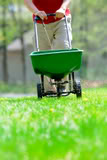Organic Fertilizer

Organic fertilizer is the best option for fertilizing your lawn and garden. Chemical-based fertilizers are becoming less popular as more Americans grow to understand how unsafe and environmentally unfriendly they actually are. Organic lawn care is part of a greener, more natural approach to gardening. The holistic organic method helps to build healthy soil, thus helping homeowners avoid many problems and eliminate the need for toxic chemicals. Consult a local landscaper for more tips on fertilizing the lawn in your area.
What Is Fertilizer?
Fertilizer is any substance, such as manure or a mixture of nitrates, that is used to make soil more fertile. Chemical fertilizers release nutrients rapidly, which is not as beneficial to the soil. Organic lawn fertilizers, which are known for their slow-release capabilities, benefit the soil as well as your grass. These fertilizers, which work to improve soil structure, have long-lasting, beneficial effects on soil microbes.
Organic vs. Chemical Fertilizer: A Comparison
Chemical Fertilizer
- May burn plants (and harm delicate seedling roots)
- Leaching can pollute groundwater
- Loss of fertilizer due to leaching means soil requires many applications
- Can make soil toxic after continuous use
- Mineral salts can build up over time and kill off soil microbes
- High nitrogen levels may repel earthworms
- Can deplete soil over time
Organic Fertilizer
- Non-burning (won’t harm delicate seedling roots)
- Improves soil structure
- Increases water-holding capacity
- Increases nutrient-holding capacity
- Promotes earthworms and soil micro-organisms
- Buffers soil from chemical imbalances
- Improves soil over time
Types of Organic Fertilizer
Dry Organic Fertilizer: Dry organic fertilizer is often made from rock, phosphate, green-sand, steamed bone meal or kelp, or a combination of these. They are formulated to provide balanced amounts of nitrogen, potassium and phosphorus as well as essential micronutrients.
Liquid Fertilizer/Foliar Fertilizer: Foliar feeding is an alternate method to heavy watering or root drenching of plants.
Foliar fertilizer delivers nutrients through the leaves of plants and is sprayed on the plants. This organic fertilizing method is a great way to improve the health of your plants. Keep in mind that liquid foliage fertilizers are excellent for plants already rooted in pots or in your garden, as it allows you to continue feeding your plants after they are established. Liquid fertilizers, sometimes composed of fish emulsion and compost tea, generally have a much quicker release than organic dry fertilizers, so you can revive that special plant immediately if need be.
Common Organic Fertilizer Ingredients
- Bird and animal manures: Good nutrient source and chockful of microorganisms. Should be well aged or composted before application directly to the garden.
- Blood meal: Slow-release source of nitrogen plus trace minerals. Apply just before planting and use sparingly.
- Fish meal/emulsion: Source of nitrogen, phosphorus, potassium and trace elements. Releases quickly.
- Greensand: Rich in potassium and numerous micronutrients. Can be used to loosen clay soils. Apply 5–10 lbs per 100 square feet.
- Shellfish meal: Strong source of calcium (23 percent), nitrogen, phosphorus and micro-nutrients. May also be used to inhibit root-knot nematodes.
- Rock phosphate: Great for flowering plants and provides a 10-year phosphate reserve.
Updated April 25, 2018.
Looking for a Pro? Call us (866) 441-6648

Landscaping Average Costs
Landscapers Experiences

Seamless Extension Of Concrete Patio And Poolside Retaining Wall

Careful, Professional Tree Service Removes A Huge Norway Maple



